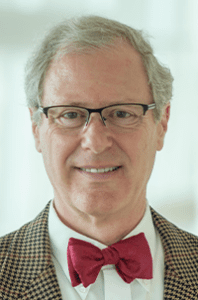Published: Wednesday, July 20, 2022, 10:00 a.m. U.S. Eastern Time
Media Contact: Kara Flynn, 202.257.8424, press@ashg.org

ROCKVILLE, MD – The American Society of Human Genetics (ASHG) has named Maurice Godfrey, PhD, as the 2022 recipient of the Arno Motulsky-Barton Childs Award for Excellence in Human Genetics Education. Dr. Godfrey is a Graduate Faculty Fellow and Professor at the Munroe-Meyer Institute of the University of Nebraska Medical Center in Omaha.
This award, which includes a plaque with a $10,000 prize, recognizes individuals for contributions of exceptional quality and importance to human genetics education internationally. Awardees have had long-standing involvement in genetics education, producing diverse contributions of substantive influence on individuals and/or organizations.
“The Society is pleased to recognize Dr. Maurice Godfrey for his contribution to science education at all levels, from secondary students to postdoctoral fellows and he is an outstanding scientist and extraordinarily dedicated and talented educator,” ASHG President Charles Rotimi, PhD, said. “Among his many achievements, Dr. Godfrey has had a decades-long commitment to engaging with Native American communities on topics in genetics and continues to lead programs that engage tribal school students in scientific pursuits throughout Nebraska and South Dakota.”
Dr. Godfrey was born and raised in Addis Ababa, Ethiopia. He received his PhD in Pathobiology and Immunology from Columbia University in New York, moved to Oregon for a postdoctoral fellowship at the Shriners Hospital for Crippled Children and the Oregon Health Sciences University with the late David Hollister, and arrived at the University of Nebraska Medical Center in Omaha over thirty years ago.
In his research, he has greatly contributed to the study of Marfan syndrome. His education work commenced in 2005 when he began leading a National Institutes of Health (NIH) program to bring science to schools and communities on Indian reservations in Nebraska and South Dakota. As a tribal leader once told him, there are 500 tribes, 500 locations, and 500 languages to work with on the reservations. He approached each tribe with which he worked with open ears and listened to their challenges and needs. With that information, he has created and maintained relationships and trust with Native American leaders, communities, schools, teachers, and students.
The activities he has created run the gamut from traditional classes, laboratories, field work, scientific games and reasoning, visits to scientific corporations, and visits from people from their own communities for whom engagement in science is something to be shared and enjoyed. One notable activity is a poster series which features over 50 contemporary Native Americans who work in a range of science and health professions and who come from the communities served by the programs he leads. Dr. Godfrey has also served, both as a member and as Chair, on the ASHG Public Education and Awareness Committee.
“This is an award that I think reflects the thinking and wishes of both of the individuals for which the award is named,” says Dr. Godfrey’s nominator, Peter H. Byers, MD, Professor, Department of Laboratory Medicine and Pathology and Professor, Department of Medicine (Medical Genetics) at the University of Washington. “Arno’s great hope was to teach everyone with whom he came in contact how to ‘think genetically.’ Barton expressed it a little differently and perhaps in more of a clinical context—’why is this person here now, for this reason, in this context, and in his family environment.’ It takes little effort to see how turning that thought inward to ask about origins and how to understand them genetically describes the work that Maurice has undertaken with the students he works with.”
Dr. Byers concludes his nomination letter by stating: “This is an award made for Maurice. Barton and Arno clearly had him (well, perhaps someone like him doing what he is doing) in mind when they thought about teaching and learning. Maurice will keep their visions alive.”
ASHG will recognize this year’s award winners in the weeks prior to the Society’s annual meeting with a series of videos honoring their accomplishments. These videos will also be presented during the meeting, which will be held in Los Angeles on October 25-29.
* * *
About the American Society of Human Genetics (ASHG)
Founded in 1948, the American Society of Human Genetics is the primary professional membership organization for human genetics specialists worldwide. Its nearly 8,000 members include researchers, academicians, clinicians, laboratory practice professionals, genetic counselors, nurses, and others with an interest in human genetics. The Society serves scientists, health professionals, and the public by providing forums to: (1) share research results through the ASHG Annual Meeting and in The American Journal of Human Genetics and Human Genetics and Genomics Advances; (2) advance genetic research by advocating for research support; (3) educate current and future genetics professionals, health care providers, advocates, policymakers, educators, students, and the public about all aspects of human genetics; and (4) promote genetic services and support responsible social and scientific policies. For more information, visit: http://wptest.ashg.org.
6120 Executive Blvd, Suite 500 | Rockville, MD 20852 | 301.634.7300 | society@ashg.org | www.ashg.org
Connect with ASHG on Twitter (@GeneticsSociety) | Facebook | LinkedIn
